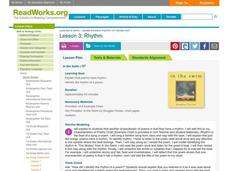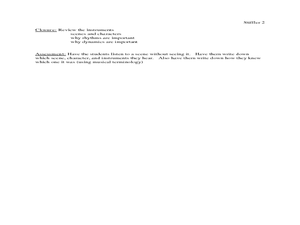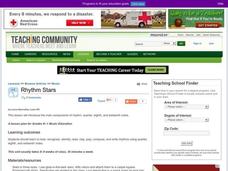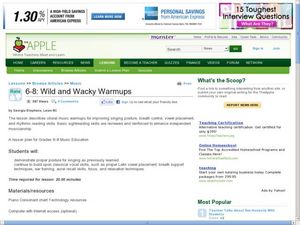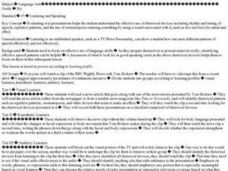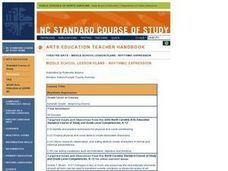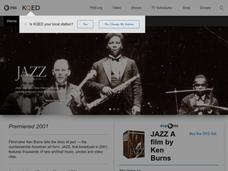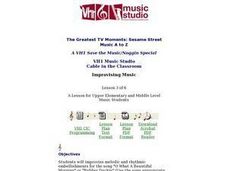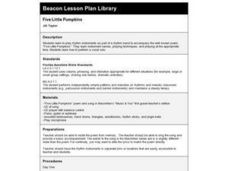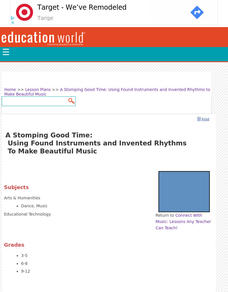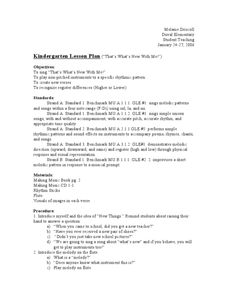Curated OER
Low and High with Ives
First graders read the Poem "The Elephant" by Shel Silverstein and create a descriptive web in the shape of an animal. In this cross curricular music lesson, 1st graders recite a poem with rhythm, then listen to the song "The...
Curated OER
Rhythm
One of the most fun characteristics of a poem is rhythm! Little ones will clap along as you read a poem, to determine the rhythm of the piece. The book In the Swim is used throughout the lesson; it contains fish themed poems that kids...
Curated OER
Rock N Rhythm & Rhyme
Learners explore rhyming and rhythm. In this rhythm and rhyme instructional activity, students listen to the song, "A-Hunting We Will Go" and add new verses to the song with words that rhyme. Learners use an interactive tool to create...
Curated OER
Tumbling and Movement
Young scholars perform basic tumbling activities. In this movement lesson, students practice tumbling and balancing moves while listening to music. Young scholars are "frozen" into place while in certain positions.
Curated OER
Analyzing and Describing Music
Learners analyze instrumental music. In this instrumental music lesson, students investigate musical works of art. Learners describe the instruments they hear and discover the relationship between music and other...
Curated OER
Can You Compose?
Fourth graders investigate musical notes. In this music lesson plan, 4th graders compose a short song while clapping the rhythm and singing the syllables using the appropriate notes or rests.
Curated OER
Rhythm Stars
Students listen, clap, compose and identify various rhythms. In this rhythm lesson, students practice rhythm with rhythm cards. Students become familiar with stick notation. Students glue Popsicle sticks to illustrate rhythms.
Curated OER
Wild and Wacky Warmups
Students explore vocal music techniques. In this vocal music instructional activity, students follow a series of warmup exercises modeled by the teacher, then participate in specific breathing and vocalizing exercises.
Curated OER
Evaluating Oral Presentation
Sixth graders examine the use of rhetorical devices in oral presentations. In this rhetorical device lesson, 6th graders watch a newscast of a major TV news personality to observe how speech patterns and rhythms are used effectively....
Curated OER
Reading Basic Music Notes
First graders develop skills in reading music notes. In this reading music lesson plan, 1st graders clap and chant rhythm patterns and learn music vocabulary. Students also match patterns by listening to the teacher perform the pattern.
Curated OER
Strange Sounds
Young scholars investigate sound as a form of energy. In this energy, forces, and sound lesson plan, students explore how different sounds may be made as they make a variety of materials vibrate. Young scholars observe the effects of...
Curated OER
I Spy Poetry
Students identify and interpret the rhythm and form of the I Spy poem.
They then integrate art, music, literature, technology, and writing with poetry. Students also write their own poem based on the picture they printed from the I Spy...
Curated OER
Cha-Cha Dribble
Students work on dribbling with either hand. They follow directions and the rhythm of the music. Students dance to the Cha-Cha slide according to its directions and they add the dribble of the bbasketball with the number of "stomps."
Curated OER
"Let's Write a Song"
Fourth graders analyze, brainstorm and practice playing a melody/pattern with rhythm, tempo, dynamics, and instrumental pieces of many styles. In addition, they create an original piece of music.
Curated OER
Rhythm In Motion
Sixth graders work independently and with a partner to demonstrate proficiency of steady beat, meter and basic note values while creating written rhythmic patterns for class performance. State and National Standards are addressed.
Curated OER
Rhythmic Expression
Students discover movement and expression to music/sound through a series of teacher-led exercises and role plays. This instructional activity is ideal for the middle school drama class with possibilities for adaptation to any level of...
Curated OER
Poetry: Using Prosodic Devices
Students examine poetry examples in free verse focusing on their prosodic elements. After critiquing works by several authors, they write their own poems utilizing such devices as alliteration, repetition, rhyme, and stanzas.
Curated OER
Jazz and Math: Rhythmic Innovations
Students watch a segment of the PBS Ken Burns JAZZ documentary about Buddy Bolden creating the "Big Four." They compare and contrast the rhythms of marches and jazz based on the examples in the film, and explore notation, subdivision of...
Curated OER
Improvising Music
Students watch "The Greatest TV Moments: Sesame Street Music A to Z" and improvise melodic and rhythmic embellishments for the song "O What A Beautiful Morning" or "Rubber Duckie."
Curated OER
FIVE LITTLE PUMPKINS
Students explore the rhythm instruments as part of a rhythm band to accompany the well-known poem, "Five Little Pumpkins." They study instrument names, playing techniques, and playing at the appropriate time. They study how to perform a...
Curated OER
A Stomping Good Time: Using Found Instruments and Invented Rhythms to Make Beautiful Music
Students work in small groups to use everyday objects to create performances inspired by the work of STOMP. They create a system of notation to document the music and movement of a 2-minute performance.
Curated OER
Singing "What's New With Me"
Kindergarteners sing the song, "What's New With Me" adding rhythm with each go around. They clap, tap, and sing along with the teacher. Note: The song or song lyrics are not included.
Curated OER
the Baroque Period
Baroque styles in music, together with trends in tone, melody, and form are summarized in these slides. The points given are short and relevant. There is only a small amount of information, so this would be best as an accompaniment...



